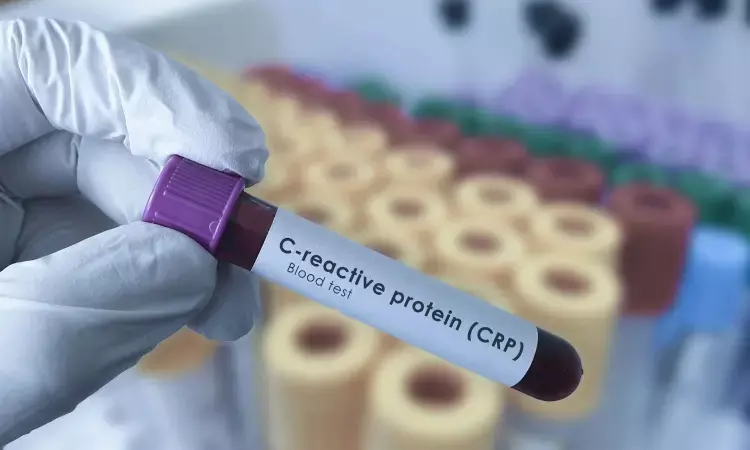- Home
- Medical news & Guidelines
- Anesthesiology
- Cardiology and CTVS
- Critical Care
- Dentistry
- Dermatology
- Diabetes and Endocrinology
- ENT
- Gastroenterology
- Medicine
- Nephrology
- Neurology
- Obstretics-Gynaecology
- Oncology
- Ophthalmology
- Orthopaedics
- Pediatrics-Neonatology
- Psychiatry
- Pulmonology
- Radiology
- Surgery
- Urology
- Laboratory Medicine
- Diet
- Nursing
- Paramedical
- Physiotherapy
- Health news
- Fact Check
- Bone Health Fact Check
- Brain Health Fact Check
- Cancer Related Fact Check
- Child Care Fact Check
- Dental and oral health fact check
- Diabetes and metabolic health fact check
- Diet and Nutrition Fact Check
- Eye and ENT Care Fact Check
- Fitness fact check
- Gut health fact check
- Heart health fact check
- Kidney health fact check
- Medical education fact check
- Men's health fact check
- Respiratory fact check
- Skin and hair care fact check
- Vaccine and Immunization fact check
- Women's health fact check
- AYUSH
- State News
- Andaman and Nicobar Islands
- Andhra Pradesh
- Arunachal Pradesh
- Assam
- Bihar
- Chandigarh
- Chattisgarh
- Dadra and Nagar Haveli
- Daman and Diu
- Delhi
- Goa
- Gujarat
- Haryana
- Himachal Pradesh
- Jammu & Kashmir
- Jharkhand
- Karnataka
- Kerala
- Ladakh
- Lakshadweep
- Madhya Pradesh
- Maharashtra
- Manipur
- Meghalaya
- Mizoram
- Nagaland
- Odisha
- Puducherry
- Punjab
- Rajasthan
- Sikkim
- Tamil Nadu
- Telangana
- Tripura
- Uttar Pradesh
- Uttrakhand
- West Bengal
- Medical Education
- Industry
CRP point-of-care test reduces antibiotic use in patients with acute exacerbations of COPD, reveals research

A new study found that the C-reactive protein point-of-care test (CRP-POCT) is a low-cost technique for safely lowering antibiotic use in patients with acute exacerbations of COPD (AECOPD). The findings were published in the British Journal of Medicine.
Around 4.5% of UK individuals over the age of 45 have been diagnosed with chronic obstructive pulmonary disease (COPD), and almost half of these have one or more acute exacerbations of COPD that require medical treatment each year. Antibiotics are prescribed to around 80% of these patients, the majority of whom receive them in primary care.
While some patients benefit from these medications, many AECOPD episodes are caused by non-bacterial factors. Point-of-care testing (POCTs) for acute infections are being advocated in an effort to decrease unnecessary antibiotic administration, combat antimicrobial resistance, and enhance patient outcomes. Thus, Bernadette Sewell and team present the results of a health economic evaluation to determine whether CRP-POCT is a cost-effective alternative to routine clinical assessment to guide antibiotic use and prescribing in patients with AECOPD in primary care.
This multicenter, parallel-arm, open, individually randomized, controlled PACE trial included participants in primary care. PACE included 324 and 325 consenting patients with AECOPD in the usual-care and CRP-guided groups, respectively. This research evaluated the cost-effectiveness (CE) of using a C-reactive protein point-of-care test in conjunction with standard clinical assessments to guide antibiotic treatment for AECOPD in primary care.
Although both groups had identical clinical results, the CRP-guided group consumed 20% fewer antibiotics. The £11.31 cost of CRP-POCT per test was significantly compensated by COPD-related healthcare resource savings. The average incremental CE ratios for CRP-POCT were £120 for 1% absolute decrease in antibiotic usage at 4 weeks and £1054 each quality-adjusted life-year (QALY) gained at 6 months.
Sensitivity analysis revealed that changes in healthcare prices had the greatest impact on CEA findings, whereas marginal variations in costs and outcomes influenced CUA. CRP-POCT is 73% cost-effective at a WTP of ≤£20,000 per QALY gained.
Overall, this data gives strong evidence that CRP-POCT is a cost-effective strategy for reducing antibiotic prescribing in primary care for patients with AECOPD without compromising health outcomes or healthcare expenditures. CRP testing has been suggested by NICE as a primary care predictor of pneumonia.
Source:
Sewell, B., Francis, N., Harris, S., Gillespie, D., Bates, J., White, P., Alam, M. F., Hood, K., Butler, C. C., & Fitzsimmons, D. (2024). Cost-effectiveness of C-reactive protein point of care testing for safely reducing antibiotic consumption for acute exacerbations of chronic obstructive pulmonary disease as part of the multicentre, parallel-arm, open, individually randomised, controlled PACE trial. In BMJ Open (Vol. 14, Issue 11, p. e084144). BMJ. https://doi.org/10.1136/bmjopen-2024-084144
Neuroscience Masters graduate
Jacinthlyn Sylvia, a Neuroscience Master's graduate from Chennai has worked extensively in deciphering the neurobiology of cognition and motor control in aging. She also has spread-out exposure to Neurosurgery from her Bachelor’s. She is currently involved in active Neuro-Oncology research. She is an upcoming neuroscientist with a fiery passion for writing. Her news cover at Medical Dialogues feature recent discoveries and updates from the healthcare and biomedical research fields. She can be reached at editorial@medicaldialogues.in
Dr Kamal Kant Kohli-MBBS, DTCD- a chest specialist with more than 30 years of practice and a flair for writing clinical articles, Dr Kamal Kant Kohli joined Medical Dialogues as a Chief Editor of Medical News. Besides writing articles, as an editor, he proofreads and verifies all the medical content published on Medical Dialogues including those coming from journals, studies,medical conferences,guidelines etc. Email: drkohli@medicaldialogues.in. Contact no. 011-43720751


